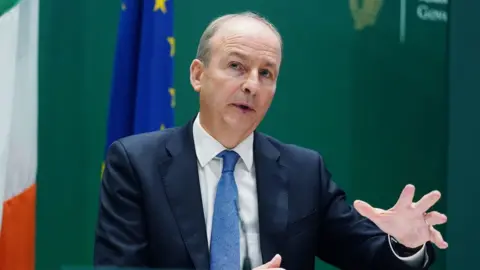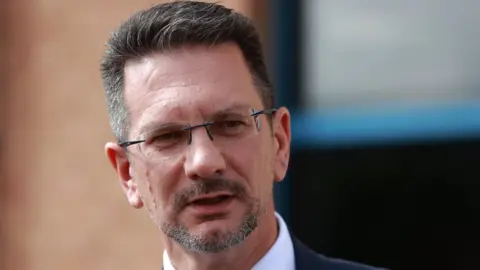Irish unity: Micheál Martin warns UK against changing vote terms
 PA Media
PA MediaUK government ministers "need to be careful" when discussing possible changes to the terms of a referendum on Irish unity, Micheál Martin has said.
The tánaiste (Irish deputy prime minister) was speaking after Northern Ireland Office Minister Steve Baker reportedly said such a vote should need a "super-majority" for it to succeed.
At present, such a referendum requires a simple majority of 50% plus one.
Mr Martin told BBC News NI: "You can't rewrite agreements on the hoof.
"You can't say: 'Well, you need 60% for this or 70% for that' - referendums are referendums.
"These are very fundamental constitutional changes that were endorsed by the people of the island, it's a very important point - we can't just casually dismiss that."
The 1998 Good Friday peace agreement states that Northern Ireland's constitutional status cannot change without the consent of a majority of its people.
 PA Media
PA MediaThis week Mr Baker said he believed a super-majority was necessary for a united Ireland after the UK's experience with the Brexit referendum.
Although he supported the Leave campaign in that poll, he has since said he regrets that it did not require the support of 60% of those who voted.
His suggestion was criticised by SDLP leader Colum Eastwood, who said there could be no "changing the goalposts" on the level of support needed for a vote on Irish unity to pass.
But Mr Baker's proposal has since been played down by Northern Ireland Secretary Chris Heaton-Harris, who said it did not signal a shift in government policy.
Speaking on BBC News NI's Sunday Politics programme, Mr Martin said politicians should focus on "practical things".
"You had your 70% or plus, if I recall, for the referendum on the Good Friday Agreement and I think what's important is that we focus on the evolving situation," he said.
"Why do we always end up getting into arguments about super-majorities and everything else when really the people want us to do practical things that benefit their daily lives?"
